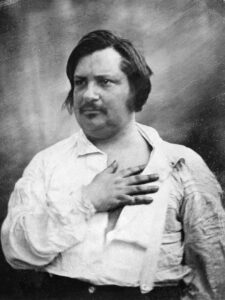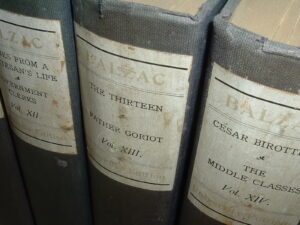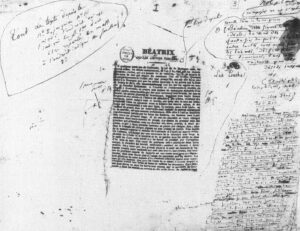Honoré de Balzac – The Human Comedy: Books That Killed Their Authors #8
Honoré de Balzac: Books That Killed Their Authors
In the case of Honoré de Balzac it wasn’t just one book that killed him. It was ALL of his books.
Born 20 May 1799 in Tours, France, Honoré de Balzac is considered the father of realism in European literature. He influenced many writers who were themselves very influential: Émile Zola, Charles Dickens, Marcel Proust, Gustave Flaubert, and Henry James, among others. Filmmakers François Truffaut and Jacques Rivette claimed Balzac as an influence.
Balzac’s greatest work, Le Comédie humaine, The Human Comedy, isn’t just one or two books or set of a few stories.
Le Comédie humaine, is a monumental collection of 91 interrelated works: novels, stories, and essays. Also considered part of Le Comédie humaine are 46 unfinished works, some that are just titles of books he planned to write.
Le Comédie humaine is just a portion of Balzac’s literary output. It doesn’t include his five theatrical plays, a collection of humorous stories Les Cent Contes drolatiques (1832–37) or his early works and at least nine works written under a pen name or anonymously.
Balzac had already written several novels, not all of them considered good, when he got the idea for the Le Comédie humaine while writing Eugénie Grandet in 1833. Originally serialized in newspapers, Eugénie Grandet appeared in book form in 1835 and became Balzac’s first best-seller.
La Comédie Humaine is a reference to Dante’s medieval poem, Divine Comedy, about a journey through the Roman Catholic version of the afterlife.
Balzac died in Paris in on 18 August 1850, age 51. His career was considered “active” from 1829 to his death. Based on the completed works in Le Comédie humaine alone, this represents an output of three major works per year. Obviously, he wrote far more than what ended up in Le Comédie humaine.
And this is considering he also pursed a series of ultimately unsuccessful business ventures during the 1820s. Before and during his career as a writer, he attempted to be a publisher, printer, businessman, critic, and politician. His relationship with his family was often strained by financial and personal drama. He failed at every endeavor.
Except writing.
So how did he do it? How did he scratch out so many words in a 31-year career?
Caffeine is one answer. His coffee intake helped propel a punishing writing regimen. Balzac suffered from health problems throughout his life, possibly owing to his intense writing schedule and penchant for coffee. A lot of coffee.
Balzac’s writing work habits were legendary.
His prefect writing day went like this:
Eat a light meal at five or six in the evening. Then sleep until midnight.
He would then rise and write, fueled by numerous cups of black coffee consumed on an empty stomach. Balzac allegedly drank as many as 50 cups of coffee per day, though this amount may be apocryphal.
https://francetoday.com/culture/made_in_france/a-cup-of-the-strong-stuff-honore-de-balzacs-coffee-habit/
What is certain is that he wrote from 1 A.M. to 8 A.M., sometimes longer. He often worked for 15 hours or more. He claimed to have once written for 48 hours with three hours of rest.
Balzac also wrote rapidly. His quills could fly like the fowl they’d been plucked from. Writing with a quill, he allegedly could equal a pace of 30 words per minute on a typewriter. Balzac’s productivity is made all the more astonishing by the fact that he wasn’t just a prolific writer, he was an obsessive re-writer, constantly revising and refining his work.
Coffee was so central to his work that Blazac wrote Traité des excitants modernes, “Treatise on Modern Stimulants,” which analyzes the social impact of five commonly used stimulants: tea, sugar, coffee, alcohol, tobacco. The treatise includes anecdotes about the author overindulging in coffee, cigarettes and alcohol. It was first published in 1839 as an appendix to the landmark gastronomic work, Physiologie du goût, Physiology of Taste, by Jean Anthelme Brillat-Savarin.
https://www.academia.edu/110471429/Honor%C3%A9_de_Balzac_s_Treatise_on_Modern_Stimulants_An_Annotated_Translation
Balzac wrote of coffee:
“Under certain exceptional conditions, the state you are in when you drink coffee on an empty stomach produces a kind of nervous energy that resembles anger: your voice is raised, your gestures denote a pathological impatience; you want everything to get moving, your ideas race; you are antagonising, enraged for no reason; you embody the temperamental character of the poet who is so often condemned by grocers; you imagine others are as lucid as you feel. A man of intelligence would be wise to neither reveal himself nor let others approach. I discovered this rare state by certain happenstances that made me lose, without trying, the exaltation I had procured. Some friends, at whose country house I was staying, saw that I was bad-tempered and bellicose, hypocritical in conversation. The next day, I acknowledged my faults, and we sought the cause. My friends were learned men of the highest order, we had soon found it: coffee wanted a victim.”
With the amount of caffeine he consumed, it’s not difficult to imagine this. It’s also not difficult to imagine that caffeine, as well as alcohol and tobacco, contributed to his demise.
Balzac died of gangrene associated with congestive heart failure on Sunday, 18 August 1850.
His deteriorating health became a sort of tragedy vortex. Just five months earlier, Blazac had married Eve de Balzac, the former Countess Hańska.
Realizing the end was near for Balzac, his friend, author Victor Hugo, visited Balzac the day he died. https://tarnmoor.com/2014/08/19/victor-hugo-on-balzacs-death/ Hugo was a pallbearer and the eulogist at Balzac’s funeral. https://www.gavroche.org/vhugo/balzaceulogy.shtml
At the time of his death, Balzac’s exhausted wife had gone to bed and his mother was alone by his side.
Coffee found a victim in Balzac.
Balzac’s books, in order of publishing date.
https://www.bookseriesinorder.com/honore-de-balzac/
Books That Killed Their Authors: The Series
![]() Truman Capote – Answered Prayers: Books That Killed Their Authors #7
Truman Capote – Answered Prayers: Books That Killed Their Authors #7
![]() Franz Kafka – A Hunger Artist: Books That Killed Their Authors #6
Franz Kafka – A Hunger Artist: Books That Killed Their Authors #6
![]() Harriet Beecher Stowe – Uncle Tom’s Cabin: Books That Killed Their Authors #5
Harriet Beecher Stowe – Uncle Tom’s Cabin: Books That Killed Their Authors #5
![]() Jane Austen – Persuasion and Sanditon: Books That Killed Their Authors #4
Jane Austen – Persuasion and Sanditon: Books That Killed Their Authors #4
![]() Charles Dickens – The Mystery of Edwin Drood: Books That Killed Their Authors #3
Charles Dickens – The Mystery of Edwin Drood: Books That Killed Their Authors #3
![]() John Kennedy Toole – A Confederacy of Dunces: Books That Killed Their Authors #2
John Kennedy Toole – A Confederacy of Dunces: Books That Killed Their Authors #2
![]() Karl Marx – Das Kapital Volumes II and III: Books That Killed Their Authors #1
Karl Marx – Das Kapital Volumes II and III: Books That Killed Their Authors #1



